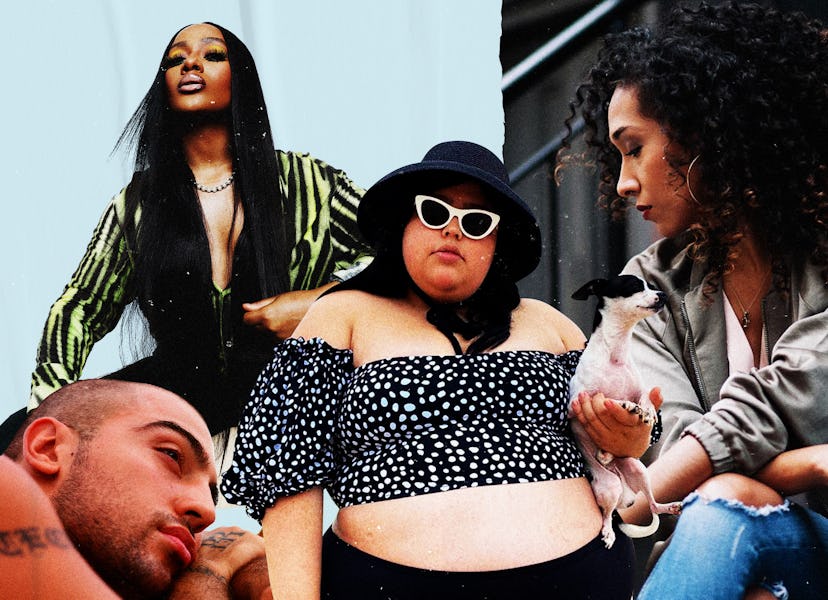Jessica Torres, @thisisjessicatorres
"I've always been a fat person, so as a teenager fashion was something aspirational," Jessica Torres tells NYLON. "I was just dressing to cover up my body, not really to express who I was or who I wanted to be in front of other people."
How do you manage your large following and Latinx representation?
JT: For all the Latinos in positions like mine, especially if you're a white Latino like me, we need to open the doors to our darker-skinned cousins, sisters. There's a lot of privilege for the reason that I'm being interviewed.
MonicaStyleMuse, @monicastylemuse
Growing up in Brooklyn, fashion and beauty were always a part of Monica Style Muse's life. "As a Dominicana, my family was always dressed to the nines," she tells NYLON.
What do you think about Latinx and more specifically, Afro-Latinx representation, in fashion right now?
M: We are heading in the right direction. My brother Juan Veloz shot a spread embracing Latinx for Vogue Mexico. There was also beautiful, transgender representation, and that was something so revolutionary to see; the representation of Afro-Latinos in that light. And the cover was shot by Renell [Medrano], who is also Dominicana.
It's important for fashion companies to really wake up and know who they put on covers and in their magazines. And if it is a Latino magazine, granted I know that sometimes magazines want to feature all types of nationalities and races, and that's fine, but what have they done for the cultura?
Has your cultural heritage ever influenced your style choices?
M: I give all the kudos and all the flowers to my mom, my abuelita, and my tía. They always told me to appreciate my curvas and never let a man tell you what you can and cannot do. I got into social media with that instilled in me.
Matthew Mazur, @mazurbate
Matthew Mazur became interested in fashion while studying art and interning at a denim company. "I didn't even know fashion was a thing really," he tells NYLON. A job with Jeremy Scott was the beginning of his styling career, and everything fell into place from there.
What does it mean to you to represent heritage through fashion?
MM: It's important to know that people like us exist in this world, because when I was growing up and looking up to people, no one really looked like me. I still feel that way, whether it's someone that is gay, or Latin, or mixed, or just the way that they dress. It's really important to hold onto the sense of self that you are born with because we all go through a period where we kind of abandon that to fit into what society tells us to do, which is kind of a more Caucasian side of things.
Embrace who you are because being your authentic self is always the best thing that you can be. And that's something that I've always learned through my experience.
Has your cultural heritage ever influenced your style choices?
MM: I'm super attracted to being Peruvian and Polish, and I identify more with my Peruvian side. The colors in Peru are so vibrant and there's just like crazy patterns. I didn't necessarily appreciate that when I was younger, and as I got older and was in fashion more, I started doing more research, and that's where it started to come out more. I found out that John Galliano once did a whole collection that was inspired by Peru.
Rocío Mora, @risasrizos
Rocío Mora first became interested in fashion while in high school, and started modeling when she was about 17 years old. "What I have loved about modeling the most is really exploring different fashion styles, but what I've learned about fashion over the years was to really connect with pieces that give me confidence," Mora tells NYLON.
Has your cultural heritage ever influenced your style choices?
I don't know why but I've always gravitated towards pieces that reflect my heritage. Whether it's a graphic tee that boldly states that I'm Latina, or subtle floral designs on a flowy dress or top that reminds me of traditional garments from Honduras or Mexico, which is where my parents are from. Wearing these pieces gives me a sense of pride.
What does it mean to you to be Latinx in the United States right now?
It means everything! This is the year of change on so many levels. And as a Latina in this country, I feel it's my duty to speak up and make my presence known to inspire others to be a part of that change. So that other Latinos can say, 'Hey, she's like me and she's doing something to make a difference in our community.' There's power in numbers.
